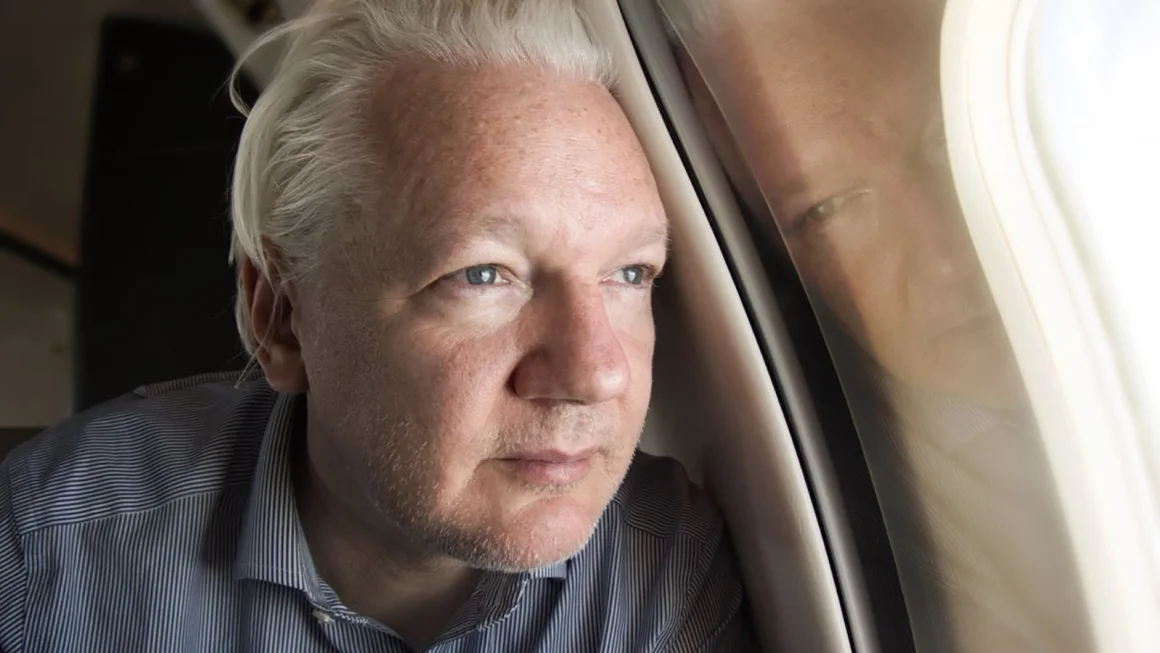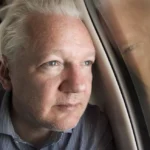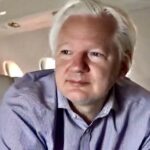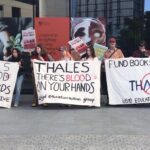He survived. He’s free. He’s home.
Notwithstanding his abuse and torture for over a decade, Wikileaks founder Julian Assange has successfully waited it out. There’s little doubt that his release was assisted by political pressures coinciding with a looming US election, the mounting Assange campaign in the United States and perhaps also by Australia’s “quiet diplomacy”, but in reality there are probably other factors at play, too.
Given that Assange won the right to appeal to the UK’s highest court, and considering the Perfected Grounds of Appeal filed on his behalf, it is not improbable that the United States was advised that the writing was on the wall as far as its extradition request went and the risk of global humiliation in failing to have Assange extradited.
There was also a real risk of a dangerous precedent being set in terms of findings that might be made about legal questions like the selective application of the First Amendment and extraterritoriality, as well as embarrassing factual findings about the suitability of carceral facilities in the United States, his likely treatment there and the reliability of US assurances.
This seems to be supported by Assange’s criminal defence lawyer, Barry Pollack, when he confirmed yesterday that, “The negotiations were a protracted process that went on for several months in fits and starts. They were not close to any sort of resolution until a few weeks ago when the Department of Justice reengaged in the very intense negotiations over the last few weeks.”
The 150-page Perfected Grounds of Appeal is even more striking when read as a summary of the brutality of the United States’ actions on a global scale. In the context of AUKUS, all Australians should be asking larger questions about the criminal enterprise that underpins Australia’s relationship with the United States.
The claim by some US officials that the plea arrangement and Assange’s consequent conviction reflect a victory is preposterous. How could any person who has been subjected to the treatment Assange has not accept an offer to plea to the comparatively minor offence of conspiring to commit espionage and walk free, rather than spin the judicial roulette wheel, weighted by legislation favouring the persecutors, and risk extradition and death?
And further, as Assange’s criminal defence lawyer, Barry Pollack, put it:
“Mr Assange was not going to agree to any disposition in this case that required him to accept allegations that are simply not true. Mr Assange did not plead guilty to, and would not plead guilty to, 17 counts under the Espionage Act, computer hacking.
“There is a very narrow agreed upon set of facts here and Mr Assange acknowledges that of course he accepted documents from Chelsea Manning and published many of those documents because it was in the world’s interest that those documents be published. Unfortunately that violates the terms of the Espionage Act. That’s what we acknowledged today. We also said – Mr Assange said very clearly – he believes there should be First Amendment protection for that conduct but the fact of the matter is that as written the Espionage Act doesn’t have a defence for the First Amendment. So what he acknowledged is what he has to acknowledge which is true and nothing he should be ashamed of. Yes, he received classified information from Chelsea Manning and he published that information. That should not be a crime.”
LISTEN TO THE WARNINGS
Compared to the outraged “principled” position the United States has taken since Assange began publishing damaging information, the conviction after pleading to the single “lesser” charge is far from a victory.
Some commentators are now belatedly raising concerns about what the plea deal means for journalists when they’ve sat on their hands for over a decade instead of being up in arms about the unprecedented extraterritorial witch-hunt. Any chilling effect comes not from Assange’s plea but from their own cowardice in fearing that if they publish information that is embarrassing to the United States, they will be relentlessly pursued just as Assange was. That’s particularly the case in the United States where they are citizens of and resident in the jurisdiction.
The Assange plea deal post-dates a significant trend of reputable investigative journalists here, and even more so in the US and UK, leaving mainstream media so that they can publish uncensored the unvarnished truth. Popular support for those journalists is widespread and growing and reflects the contempt of a broad section of the public for co-opted mainstream media. Rather than laying blame on Assange for accepting a guilty plea, mainstream media and their owners should look in the mirror.
Again, defence lawyer Barry Pollack rightly confirmed that:
“What sets a chilling precedent is the prosecution, the fact that the United States elected to charge Mr Assange with violating the Espionage Act. The Court today determined that no harm was caused by Mr Assange’s publications.
“We know that they were newsworthy. We know that they were quoted by every major media outlet on the planet. And we know they revealed important information. That is called journalism. The United States prosecuted that. They exposed Mr Assange to 175 years in prison. That is what has a chilling effect.
“Today a decision that it is time for Mr Assange to go home, that doesn’t have a chilling effect. The chilling effect is the US pursuing journalism as a crime. I hope this is the first and last time that ever occurs.”
Assange’s Counsel, Jennifer Robinson, commented:
“I also want to take the time to thank the Australian people and the Australian government for all of the support that we’ve received from home in Australia. In particular, I want to thank our Prime Minister Anthony Albanese for his statesmanship, his principled leadership and his diplomacy which made this outcome possible. It was as leader of the Opposition he said and took a stand for justice and said, “Enough is enough, there is nothing to be served by Julian’s continued incarceration”. As Prime Minister he stood true to his word and he did what he needed to do to ensure Julian Assange’s freedom. He raised it at the highest level at every opportunity and when Australian officials were making outreach to the United States they knew they were acting with the full authority of the Prime Minister of Australia. It was his intention that this be done and we wouldn’t be here today without the Prime Minister of Australia’s support.
“I also want to thank our Attorney-General Mark Dreyfus, our Foreign Minister Penny Wong, and give particular thanks to our US Ambassador and former Prime Minister Kevin Rudd for his adept diplomacy and his relentless efforts in Washington that facilitated our negotiations with the United States government and ensured this outcome.
“I also want to thank our High Commissioner in London, Stephen Smith, whose tireless work enabled us all to be here today…”
A DIFFERENT OUTCOME WAS POSSIBLE
It is understandable in the circumstances and in this moment that praise would be directed towards the Australian government but it is not lost on those who have followed the Assange case for over a decade that successive governments told the Australian public on countless occasions that it could not intervene in the Assange case. That was always politically dishonest.
An accurate historical record should show that in 2012 Labor’s Attorney-General Nicola Roxon met with Assange ’s lawyer, Jennifer Robinson, and said when asked about protecting Julian, there “may be some things we can do diplomatically”. But soon afterwards she wrote to Robinson saying Australia would not be seeking to involve itself in any international exchanges about his future. And that’s what happened.
Achieving a political solution now is all well and good but the solution having been diplomatically negotiated, while the legal processes of both the US and UK were in full flight, one wonders why that could not have been done over a decade ago and saved Assange from being tortured and subject to cruel, inhuman and degrading treatment. Assange’s difficult circumstances and mistreatment spanned the time in office of the Gillard, Rudd, Abbott, Turnbull and Morrison governments.
The other untold story is the faceless senior bureaucrats and the many current and former politicians who over the years had a hand in Assange’s ongoing incarceration through departmental and diplomatic inaction as a matter of policy, as my extensive Freedom of Information work revealed over many long years.
As Assange slips into an ‘ordinary’ quiet life, for now, he should be circumspect about his freedom given the propensity of some within the United States security state to pursue their enemies indefinitely, including by extra-legal means. But if anyone knows this and can yet stand firm in the face of uncertainty and adversity, it’s Assange.
Finally, I have personally watched many good people pay high personal and career prices for their support for over a decade of the important work of Wikileaks and Assange. They all did so because it was the right thing to do and they never wavered during long and difficult battles in supporting Assange and consequently press freedom, official transparency and justice.
As Assange wrote in 2013:
“Nothing worth doing is easy. Great battles throw our characters into relief; our strengths, our weaknesses and our inclinations. Struggle cuts down opportunists, conformists and those who can’t sacrifice the minute for the hour. We have been bloodied but now we can see clearly who our friends are and appreciate their talents.”
Go well Julian Assange. Enjoy freedom with your family in the fresh air, surf and sunshine!
–
Before you go…
If you appreciate Declassified Australia’s investigations, remember that it all costs both time and money. Join more than 8,000 followers and get our Newsletter for updates. And we’d really appreciate if you could subscribe to Declassified Australia to support our ongoing investigations. Thank you.





